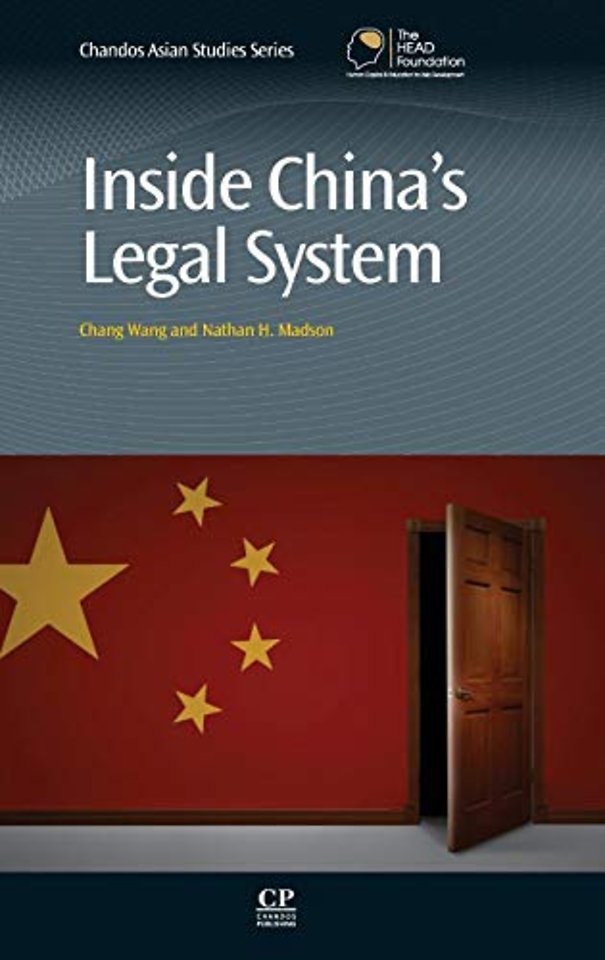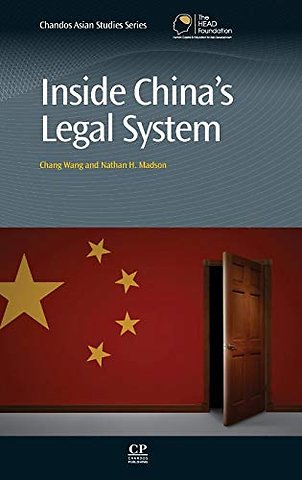<ul> <li>Dedication</li> <li>List of abbreviations</li> <li>Acknowledgments</li> <li>Foreword 1</li> <li>Foreword 2</li> <li>About the authors</li> <li>Introduction: justice with a Chinese face<ul><li>A ‘socialist system of laws with Chinese characteristics’</li><li>Historical reforms in Chinese law</li><li>Comparing Chinese and American legal systems</li><li>American perspectives on Chinese law</li><li>Human rights commentary and the Chinese response</li><li>Questions raised by the Chinese legal system</li><li>Positive developments</li><li>This book</li></ul></li> <li>Part I: Historical views<ul><li>1: Philosophical underpinnings of the Chinese legal system<ul><li>Abstract</li><li>Confucianism</li><li>Confucius’s view of law</li><li>Confucius’s view of history</li><li>Critical thinking on Confucius</li><li>The resurgence of Confucianism in China</li><li>Mencius</li><li>Legalism</li><li>Qin and the first emperor</li><li>Hidden rules and law in imperial China</li><li>Law versus morality</li><li>Penal codes</li><li>No lawyers or legal profession</li></ul></li><li>2: China and the Western influence<ul><li>Abstract</li><li>‘100 years of humiliation’</li><li>Unequal treaties between 1842 and 1949 and extraterritoriality</li><li>Nationalism</li><li>The Foreign Affairs Movement and the ti-yong dichotomy</li><li>The failed ‘100 days reform’ in 1898 and late Qing reforms</li><li>Republic of China</li><li>‘The People’s Republic’</li><li>Anti-Rightist Movement, Great Leap Forward and Great Famine</li><li>Cultural Revolution</li><li>The trial of the Gang of Four</li><li>The case of Yu Luoke</li><li>The case of Zhang Zhixin</li><li>Tiananmen</li></ul></li></ul></li> <li>Part II: The players<ul><li>3: The judiciary<ul><li>Abstract</li><li>The party and the judiciary</li><li>Non-independent judiciary</li><li>Structure</li><li>Supreme People’s Court</li><li>Are fayuan courts?</li><li>‘Judges’</li><li>Judicial examination</li><li>Judicial corruption</li><li>Procuratorates</li><li>Access to court information</li></ul></li><li>4: The police<ul><li>Abstract</li><li>Definitions</li><li>Overview</li><li>Governing law</li><li>Re-education through labor</li><li>Maintaining stability or weiwen</li><li>‘Guobao’ and ‘drinking tea’</li><li>Internet police</li><li>Detention, torture and extrajudicial killings</li><li>Yang Jia case</li><li>Wen Qiang case</li><li>Wang Lijun case</li></ul></li><li>5: The lawyers<ul><li>Abstract</li><li>Lawyers as a ‘bad element’</li><li>History of the legal profession in China</li><li>Lawyers in the PRC</li><li>Legal education</li><li>Regulating lawyers</li><li>New rules for the punishment of lawyers</li><li>‘They came for lawyers’</li><li>Lawyers, law professors and troublemakers: Zhang Sizhi, Jiang Ping, Pu Zhiqiang</li><li>Li Zhuang case</li></ul></li></ul></li> <li>Part III: Case studies<ul><li>6: Civil laws and cases<ul><li>Abstract</li><li>General principles of civil law</li><li>Selected civil laws</li><li>Commercial law</li><li>Civil procedure</li><li>Representative cases</li></ul></li><li>7: Criminal laws and criminal cases<ul><li>Abstract</li><li>Criminal law</li><li>Criminal procedure</li><li>Criminal Procedure Law amendments</li><li>The case of Liu Xiaobo</li><li>Representative cases in criminal law</li><li>The CPC and criminal law</li></ul></li><li>8: The curious case of Ai Weiwei and administrative law<ul><li>Abstract</li><li>Timeline</li><li>Procedure</li><li>The ‘tax’ case</li><li>Administrative law in China</li><li>Petition</li></ul></li></ul></li> <li>Part IV: Conclusion<ul><li>Afterword<ul><li>Is constitutionalism incommensurable with Chinese socialism?</li><li>Important updates</li><li>Conclusion</li></ul></li></ul></li> <li>Appendix 1: Constitution of the People’s Republic of China<ul><li>Preamble</li><li>Chapter I: General Principles</li><li>Chapter II: The Fundamental Rights and Duties of Citizens</li><li>Chapter III: The Structure of the State</li><li>Chapter IV: The National Flag, the National Anthem, the National Emblem and the Capital</li></ul></li> <li>Appendix 2: The socialist legal system with Chinese characteristics<ul><li>Foreword</li><li>I Establishment of the socialist system of laws with Chinese characteristics</li><li>II Composition of the socialist system of laws with Chinese characteristics</li><li>III Features of the socialist system of laws with Chinese characteristics</li><li>IV Improvement of the socialist system of laws with Chinese characteristics</li><li>Concluding remarks</li></ul></li> <li>Appendix 3: Charter ’08<ul><li>I Foreword</li><li>II Our fundamental principles</li><li>III What we advocate</li></ul></li> <li>Selected readings and resources for further research in Chinese law and history</li> <li>Index</li> </ul>

